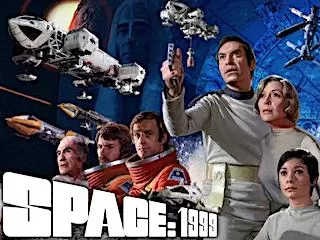Introduction – Why even reboot Space 1999?
September 13, 1999, twenty-five years ago today, is a milestone date in the world of science fiction. It is the day that radioactive waste on the moon exploded, blowing the moon out of Earth’s orbit and into deep space, taking Moonbase Alpha and its 300 or so inhabitants with it. The events of that day are chronicled in Breakaway, the pilot episode of the series Space: 1999.
At the time of the story’s telling (October 17, 1975, to be exact), 1999 was the near future, far enough that we could imagine that mankind had moved on from the space age’s infancy, but not so far into the future that the culture or technology of Moonbase Alpha seemed strange to us. Indeed, the Alphans (as the moon base’s inhabitants called themselves) were far less perfect than the explorers of Star Trek, a show set nearly two hundred years further into the future.
“Cult Favorite”
Space: 1999 still has a cult following nearly fifty years after its debut, despite lasting only 48 episodes (too few to be of interest of syndicators, who largely prefer a show to have at least 100 episodes) and having been produced by a small studio best known up to that point for a series of short-run series featuring marionettes. In our age of remakes, reboots, and sequels, many series are getting a new lease on life (for just one example: silly sci-fi pioneer Lost In Space returned as an edge-of-your seat [adventure series] in 2018), but not all do (I’m looking at you, Firefly!). Whether or not a show gets a chance to return from oblivion is dependent on many factors, some having to do with the quality of the source materials, and others having to do with financial considerations such as who owns the intellectual property.
In the following weeks, I plan to present a series of articles on the topic of How to Reboot Space: 1999, discussing which characters, concepts, and plot devices to keep, and which need to be left behind. I will also discuss Space: 2099, the closest it seems the series has come to a reboot to date. Before launching into details, though, it is worth presenting the case for rebooting the series at all… to answer the question of what makes the show worthy of being revived.
Almost the greatest Sci Fi show ever
Ask people to name the biggest Sci Fi franchises ever, and although they may differ on many of the items in their list, it’s a good bet that Star Trek and Star Wars will occupy the top two spots. Star Trek debuted in September of 1966 and ran for three years, receiving modest interest that famously grew for a decade until returning in motion picture form in 1979. Star Wars opened in late spring 1977, and it is impossible to overstate the impact it had on the world of sci-fi.
Right in the middle of the 1970s, as Star Trek was building steam and Star Wars in development and production, Space: 1999 ran for two seasons in 1975 and 1976. Chronologically, it would seem to have been in the right place at the right time. So why did Trek and Wars become immensely successful while Space: 1999 remains a “cult favorite”, not quite forgotten but always discussed in the past tense?
There are several reasons why Space: 1999 seems to have just missed its chance for greatness, but probably the most significant factor was timing, which was just a tiny bit off. Had the show gotten a third season, it would have been running just as Star Wars hit the big screen, which would no doubt have boosted its profile. (Indeed, it was the incredible success of Star Wars that helped Star Trek: The Motion Picture get the green light, in one of those “what have we got that we could make into a movie” moments at the studio boardroom.) Alas, the very high production costs and a surprising apathy in Britain (where the show was developed and filmed) meant that Space: 1999 did not quite last long enough to be top-of-mind when Star Wars kick-started the development of shows like Battlestar: Galactica and Buck Rogers.
Another factor working against it is that Space: 1999 never found its stride. For it’s entire existence, the show was being pushed and pulled by external forces, beginning with its origins as a spin-off from another show that was re-worked and rushed into production as a new series and culminating in a complete overhaul between seasons one and two in an attempt to broaden the show’s appeal to American audiences. Many shows — Star Trek’s sequel “The Next Generation” comes to mind — take a few seasons to emerge from the chrysalis stage, and that never happened with Space: 1999.
Surely there were other challenges, too, but I’ll discuss those in future posts when considering what elements of the show should stay and which should go. But first, we should consider Space: 2099, the last, most recent serious attempt to revitalize the franchise.


Leave a Reply